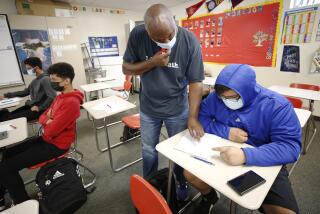Bennett’s Report Card
- Share via
The Times is to be commended for the fine editorial (Sept. 5), “Report Card,” on Secretary Bennett, but I believe that you made a mistake when you stated that his idea to “. . . open the principal’s office to managers from fields other than education comes from left field. . . .”
This proposal is most definitely from “right” field. The political right has been pushing the idea of inexpensive replacements for teachers, etc. Bennett would lower professional standards, allowing business leaders or military retirees to become principals.
Why does everyone seem to think that since they went to school, they are therefore an educator? The idea that a capable leader in one field would automatically be a good principal is as flawed as arguing that we should hire someone who has never been to school because that person would have no preconceived notions.
Secretary Bennett can serve America best if he uses his office to act as a central clearing house, suggesting guidelines for curriculum changes, advising how to shift emphasis to new areas, or publicize the myriad of ideas garnered. Actually, it would probably not cost as much as the doomsday prophets will claim, since the schools are already in place, and some existing staff can retrain or shift emphasis as needed.
Hopefully, Bennett will offer some viable suggestions on how states can pay for programs like a longer school year, or a better library.
His proposals are basically sound, and deserve thoughtful consideration. His report calls for more classroom time, more “demanding curricula,” more reading, more parental participation in the process, and teaching respect for people, property, and our American way of life.
However, to get support from the many teachers currently discouraged by several years of non-constructive criticism and Band-Aid solutions to problems of surgical proportions, Bennett should delete a couple of his philosophically narrow ideas. As an American history teacher, I think Bennett’s basic proposals for educational excellence in our time are positive, and, most important, they are attainable. It is my sincere hope that I am reading a genuine plan for tomorrow, and not mere election-year rhetoric.
WILLIAM E. HOLSTON
South Laguna






